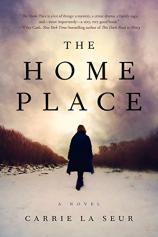The Home Place
Review
The Home Place
We all want to go home again. We are all travelers looking for something more elusive than a true soul mate or the perfect martini. Home that is larger than life yet smaller than we remember it. Home that has the ring of truth but the reality of deceit. In Carrie La Seur’s debut novel, THE HOME PLACE, Alma Terrebonne is one of these travelers, but her understanding of what home means and where she can find it comes unexpectedly.
Alma left Montana when she was 17 years old shortly after her parents died in an automobile accident. Her younger sister, Vicky, moved in with an aunt and uncle, and her older brother joined the military. Alma succeeded at Bryn Mawr (her natural ambition fueled by her English teacher, telling her to stay home and attend the local community college) and excelled at Yale Law. She is now on the fast track for partner at an impressive Seattle law firm.
The story begins on a cold January morning in Billings, Montana, with the discovery of Vicky’s body in “a part of town that has been on the wrong side of the tracks since they went in, spanning North America in the 1880s.” Alma returns home to identify her sister’s body, and she also must be responsible for family matters that she has sidestepped for many years. Foremost is answering the question about Vicky’s death: Was it deliberate or accidental? Alma’s initial reply: “The Terrebonne family is dysfunctional but not homicidal”; the final answer must change as Alma sorts through the detritus of the 15 years she has been gone.
"Perhaps we all have known someone like Alma: bright, ambitious, free of the home place. How strongly the home place calls, and how Alma responds makes for a good story."
The cast of characters is large. There’s the staff at Denny’s, where Vicky worked most recently. There’s the “crank pimp” named Murray and the other lowlifes Vicky hung out with. There’s the older brother, Pete, and his partner, Shep, managing the Itching Post, a thriving coffee shop. There’s Chance Murphy, the proverbial high school sweetheart who had always loved her, and his parents Jayne and Ed, who have never forgiven her for breaking their son’s heart. There are the rascals at the Seattle law firm waiting to poach Alma’s clients and hard work. There are the Latter-Day Saints who show up to plan Vicky’s funeral.
It is a healthy list of people to remember. So it is best to let La Seur lead you through the voices and faces, and listen to what Alma learns.
At the police station she meets Ray, a Mountain Crow from her high school days; he is all perfect regulation, well groomed, an apple (red on the outside, white on the inside). Alma’s ancestors were the white settlers waiting to move in when Ray’s ancestors were driven out by the whittling of their reservation. She remembers that Montana’s history separates people who ought to be united by a common love of fried food, powwows and rodeos. The flashbacks to the land of Custer and the Crow reveal Alma’s orientation to the rim rocks, sugar beet fields, sagebrush buttes, and magnificence of the Rockies. We learn that she dares to feel at home.
We find out more about Alma, her grandmother, and Brittany, Vicky’s 11-year-old daughter, as they reach the home place. The home place is more than a metaphor; it is a house, barns and corrals set deep in mineral-rich Montana. For a Terrebonne, “the home place is the safe haven, the convergence of waters, the place where the beloved dead are as real as the living.” A drug dealer who knew Vicky has abused the property for some months, but he is forced out. The encroachment of an aggressive land agent wanting signatures for mineral rights poses a threat to this old sanctuary, too, but Alma first reacquaints herself with this heritage.
The interruption to Alma’s life forces many reflective moments, including time with her brother. She and Pete were “quiet together. Her parents had that between them too…that calm that was a refuge. After their deaths, the calm got lost for many years. To feel it settle between them again is a rare benediction.” Alma re-learns the emotions her departure caused years ago: the anger, the betrayal, the envy.
La Seur writes back and forth between Alma’s long-established shame for Vicky and a growing understanding of who she became. One moment particularly captures this ambivalence. When Alma goes to Denny’s to inquire about Vicky, the Indian dishwasher steps out of his steaming alcove. He had been listening to her questions and asks, “Your sister walked on?” Walked on. Yes. Vicky had walked on where her ancestors were waiting. He turns a little to the left, lifts up his hands and sings in Crow, his voice rising above the kitchen noise. The others stand still until he is finished. “A travel song, for your sister’s journey to the other-side camp,” he says. Still embarrassed by the life Vicky led, Alma learns this man’s respect for her death.
The days clip by as Alma’s allotted time to solve her family’s problems dwindles. She keeps in step with her Seattle life, and we wait for her decision about where she will call home. Perhaps we all have known someone like Alma: bright, ambitious, free of the home place. How strongly the home place calls, and how Alma responds makes for a good story.
Reviewed by Jane Krebs on August 1, 2014
The Home Place
- Publication Date: March 31, 2015
- Genres: Fiction
- Paperback: 320 pages
- Publisher: William Morrow Paperbacks
- ISBN-10: 0062323458
- ISBN-13: 9780062323453





